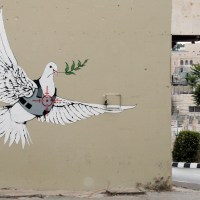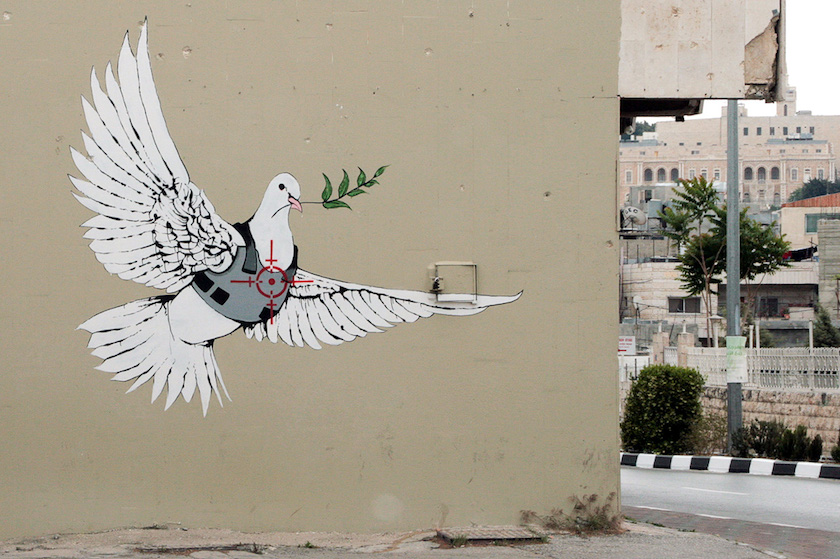Those who work for peace are sometimes perceived as being neutral. Their refusal to respond in kind to hate or aggression is sometimes seen as a refusal to take a stand against evil.
Wanting peace is not the same as being neutral. You can push for peace and justice at the same time.
There is no shortage of evil in our world, whether it takes the form of ISIS or the KKK or something subtle but pervasive like casual sexism or racism. There is nothing neutral about my feelings toward these things. I want them gone.
But in my own attempts to work for peace, I’ve come to realize that treating people who hold these ideologies with the same hate they direct toward others doesn’t accomplish anything. It just adds fuel to the fire. We pile hate on top of hate and set it aflame with angry words until we have a giant bonfire of hate that we stoke with a hyperpolarized, “us versus them” view of the world.
It’s easy to think of peacemaking as a zero-sum game, but this is a faulty view. Peace is not something we win. The end goal of real peace and real justice is not victory but wholeness—for all parties involved. We’ve got to expand our view of peace to mean more than the absence of conflict, to a recognition of our mutual humanity. And we’ve got to expand our view of justice beyond the punitive and start seeing it as something constructive, something restorative.

You can vehemently disagree with someone and still choose not to hate them. You can be sickened by their actions and still treat them as human. You can do everything in your power to stop their behavior and protect the people they’re marginalizing or hurting—without responding in hate.
When we say, “Us versus them is a false choice,” that doesn’t mean we want everyone to hold hands and sing kumbaya.
It means that once we lose sight of the humanity of others, we’ve all lost. It means that we don’t have to trade the humanity of one side for the humanity of the other. Even if someone’s beliefs and actions are despicable, if I demonize them to the point that I lose sight of their humanity and use that to justify my violence toward them, then I lose my own humanity in the process. Because violence robs both the victim and perpetrator of their humanity.
The end goal of real peace and real justice is not victory but wholeness—for all parties involved.
The problem is that this is terribly complicated in real life.
Does treating them with love mean we’re letting them get away with their violence? Isn’t that a backhanded way of condoning their actions, or at least not doing anything to stop them?
Let’s be clear: you can love someone and do everything in your power to stop them from committing violence.
You can wrestle a weapon out of someone’s hand while loving them. But there’s a difference between wrestling the weapon out of their hand and drawing your own sword to fight violence with violence. What if we love them before they can do anything to us, instead of trying to kill them before they kill us? What if our love disarms them and prevents death altogether?
This is preemptive love.
If we commit the same violence we claim to be fighting, how is that a win? If we are injured while loving others, how is that a loss? Isn’t laying down our lives out of love for others the greatest kind of love?
It’s certainly the most radical kind of love. And it is terribly difficult, confusing, and conflicting in real life.
But this is what it means to say love anyway.

It’s one thing to say this about those we love easily but whom others struggle to love (whether for us that’s Muslims or refugees or religious conservatives.) And when we use “love anyway” this way, it feels good. Maybe even a little… righteous. But it can also be used as a weapon to beat people over the head with when they don’t love the same people we do. Like the time I literally saw a guy beat someone else over the head with a sign that said “Love Your Muslim Neighbor” at a protest in Seattle.
That’s not what “love anyway” means. If we naturally love someone, we’re not really choosing to love anyway. We’re just loving them because that’s what we do.
It’s much harder to say “love anyway” about the people we actually struggle to love. The ones we really don’t WANT to love. The ones who don’t deserve our love. It is only when we doggedly keep their humanity in mind and choose to love them anyway that we can move toward wholeness and healing. For ourselves and them.
This is what peace looks like. It’s not neutrality. It’s not the absence of conflict. It’s not letting bigotry or hatred slide unchallenged.
It’s the unwavering conviction that you cannot push back hate with hate. It’s the unyielding determination to make real change on behalf of the vulnerable without using the same violence we are fighting. And it’s a relentless resolve to remake our world.


